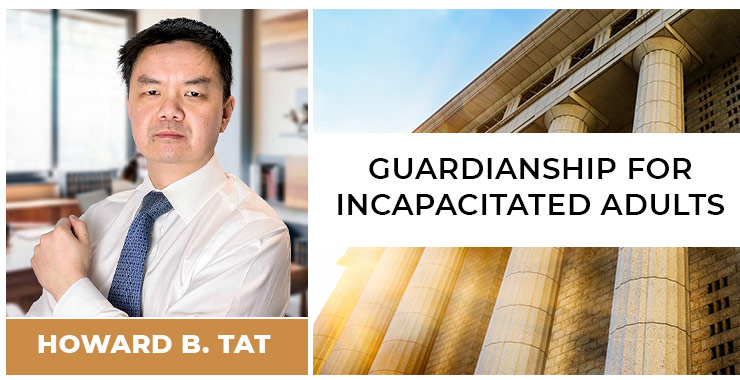Guardianship for Incapacitated Adults in Bergen County, NJ: Legal Rights, Process, and the Role of an Attorney

Guardianship Support for Incapacitated Adults in Bergen County: Howard B. Tat Law Office Located in Wallington, NJ
When a loved one can no longer manage their own affairs due to incapacitation or mental illness, the responsibility often falls on family members to find a solution that ensures their well-being and safety.
Adult guardianship provides a legal framework to protect and support those who are unable to care for themselves.
If you are in Bergen County, NJ, and need assistance with legal guardianship for adults with mental illness, adults with some form of cognitive disability from a stroke, dementia, or other health condition (i.e. a Traumatic Brain Injury), Individuals with intellectual/developmental disabilities or chronic drug or alcohol abusers, the Law Office of Howard B. Tat located in Wallington, offers experienced and compassionate legal services to guide you through this challenging process.
Understanding the Legal Process for Adult Guardianship
Adult guardianship is a legal process where a court appoints a guardian to make decisions on behalf of an incapacitated adult. This can include decisions about healthcare, living arrangements, and financial matters.
The purpose is to ensure that the incapacitated person receives the necessary care and protection when they are unable to make decisions independently.
Conditions Requiring Adult Guardianship
Guardianship may be necessary for adults facing a variety of conditions, including:
- Neurological Disorders: Conditions such as Alzheimer’s disease or dementia can significantly impair an individual’s cognitive functions and decision-making abilities.
- Mental Health Disorders: Severe mental illnesses like schizophrenia, bipolar disorder, or chronic depression can affect an individual’s capacity to manage their affairs.
- Developmental Disabilities: Conditions present from birth or early childhood, such as intellectual disabilities or autism spectrum disorders, might necessitate guardianship.
- Brain Injuries: Traumatic brain injuries that result in long-term or permanent cognitive impairments can lead to the need for guardianship.
- Chronic Illnesses: Progressive illnesses such as Parkinson’s disease or multiple sclerosis that impair physical or cognitive functions.
Legal Process for Adult Guardianship
1. Filing a Petition:
The first step in establishing guardianship is to file a petition with the local county Surrogates court. This petition must demonstrate that the individual is incapacitated and unable to manage their own affairs. It usually includes medical or psychological evaluations that support the need for guardianship.
2. Notification:
The court requires that all interested parties, including the person for whom guardianship is sought, be notified about the petition. This allows them to present any objections or provide their input during the court proceedings.
3. Evaluation:
A court-appointed evaluator, often an impartial attorney, will assess the individual’s condition to determine the extent of their incapacity after consultation with their doctors. This evaluation helps the court decide whether guardianship is necessary and what type of guardianship is appropriate.
4. Court Hearing:
During the hearing, evidence is presented to support the petition for guardianship. The court considers the evaluator’s report, testimonies from family members, and any objections or alternatives proposed. The individual in question has the right to attend and be represented by an attorney.
5. Appointment of Guardian:
If the court determines that guardianship is warranted, it will appoint a guardian. This could be a family member, friend, or professional guardian. The court will outline the guardian’s responsibilities and the scope of their authority, which can include personal care, medical decisions, and financial management.
Role of an Attorney in Guardianship Cases
Seeking guardianship can be a complex legal process, and having an experienced attorney can make a significant difference. At the Law Office of Howard B. Tat, we offer specialized services in adult guardianship and legal guardianship for adults with mental illness in Wallington, Bergen County, New Jersey. With over 15 years of experience, our office provides the expertise needed to navigate the intricacies of guardianship law.
Our attorney services for adult guardianship in Wallington, New Jersey include:
Initial Consultation: We offer a thorough initial consultation to understand your specific situation and provide tailored advice on the guardianship process.
Petition Preparation: Our team assists in preparing and filing the necessary legal documents to petition for guardianship.
Court Representation: We represent clients in court hearings, presenting evidence and advocating for the best interests of the incapacitated person.
Ongoing Support: Post-appointment, we provide guidance on fulfilling guardianship duties, including compliance with court requirements and managing the ward’s affairs.

Choosing the Right Guardianship Attorney
When selecting an attorney for guardianship matters, it’s crucial to choose someone with extensive experience and a deep understanding of local laws. The Law Office of Howard B. Tat has a proven track record in handling guardianship cases with sensitivity and professionalism. Our commitment to our clients ensures that your loved ones receive the protection and care they deserve.
Contact Us Today: If you need assistance with guardianship of adults with mental illness in Wallington, Bergen County, New Jersey, contact the Law Office of Howard B. Tat. We are here to guide you through every step of the process, ensuring a smooth and effective resolution to your guardianship needs.
 Law Office of Howard B. Tat
Law Office of Howard B. Tat
